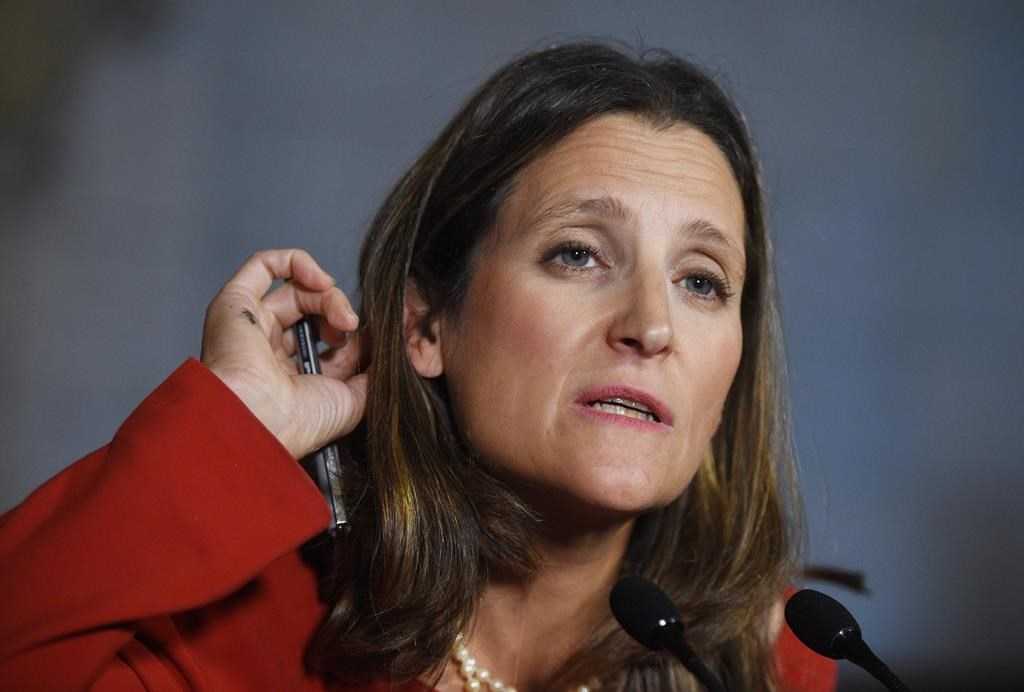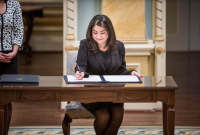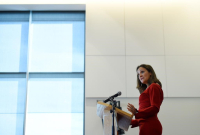Support strong Canadian climate journalism for 2025
The Liberal government wants to bring its feminism to the North American Free Trade Agreement, building on an agreement between Prime Minister Justin Trudeau and President Donald Trump to support women entrepreneurs to get gender rights in the deal.
"Canadians broadly support free trade, but their enthusiasm wavers when trade agreements put our workers at an unfair disadvantage because of the high standards that we rightly demand," Foreign Affairs Minister said Monday in a speech at the University of Ottawa.
"Instead, we must pursue progressive trade agreements that are win-win, helping workers both at home and abroad to enjoy higher wages and better conditions," she said as she unveiled some of the priorities Canada is bringing to Washington, D.C. this week for the first round of NAFTA talks.
Those progressive elements should include, Freeland said, a new chapter on gender rights as part of a larger promise to promote gender equality.
It is no secret that Trudeau and Trump are viewed as far apart on the issue.
The Canadian prime minister has proudly called himself a feminist.
Trump, whose inauguration prompted hundreds of thousands of people to march against his stances on gender issues, signed an executive order to enforce the so-called gag rule that forbids international organizations receiving U.S. funding from even mentioning abortion and plans to reinstate a ban on transgender people serving in the military.
Yet, the Liberal government, helped along by his daughter, Ivanka Trump, has managed to engage with the White House on the issue of women in the workforce and Freeland suggested that meant the door was open to a broader discussion.
"We already have something of a track record of working effectively with the U.S. administration on issues of particular concern to women," Freeland told reporters Monday, referring to the Canada-United States Council for Advancement of Women Entrepreneurs and Business Leaders.
The joint initiative aims to help women-owned businesses contribute to economic growth, competitiveness and the integration of the two economies.
"I think there is a really fruitful space for discussion," she said.
Freeland also noted Canada has done this before, when the Liberal government added a chapter on gender to its free trade deal with Chile.
That pact had both countries agree that working to include women and girls is key to long-term economic development, reaffirm their commitment to international agreements on gender rights and also work together on things like gender-based analysis.
They also set up a committee to oversee that work.
Francesca Rhodes, the women's rights policy and advocacy specialist at Oxfam Canada, said the gender rights chapter in the Canada-Chile Free Trade Agreement was a good first step, but she would like to see the new NAFTA have something stronger.
"It's not binding like the other parts of the agreement and there are no particular goals in there that are trying to be achieved," she said.
A November 2016 study on the gender impact of trade deals prepared for the European Parliament's committee on women's rights and gender equality showed how women can be bear the heavier burden when it comes to the negative impacts of liberalizing trade.
The study argued this was in the case in how NAFTA undermined the rights of small-scale farmers in Mexico and unskilled workers in the U.S. manufacturing and service sectors.
"Women workers are disproportionately represented in these groups of disadvantaged workers and, because of limited skills and assets, when they lose their jobs, struggle to find alternative forms of livelihoods," said the study.
Angella MacEwen, a senior economist with the Canadian Labour Congress, said she believes the Liberal government is serious about pushing this issue as part of its commitment to a feminist foreign policy, but it remains to be seen whether the Trump administration will be willing to give it any teeth.
"That's going to be tougher," she said.





Comments